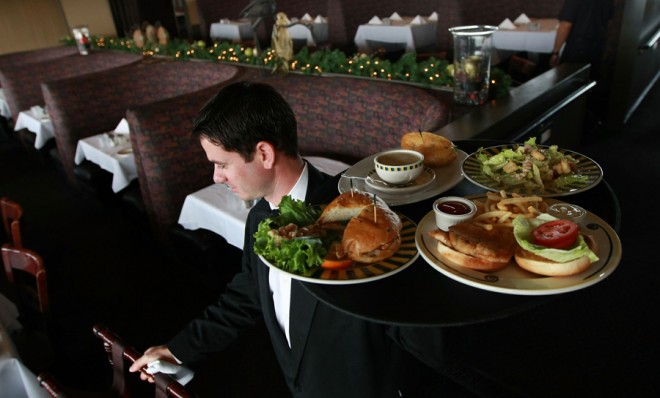Why restaurants should get rid of tipping
15 percent? 20 percent? Maybe we should just scrap the whole system altogether.

A free daily email with the biggest news stories of the day – and the best features from TheWeek.com
You are now subscribed
Your newsletter sign-up was successful
There has been a growing sentiment in the restaurant industry that tipping needs to go.
In Slate, Jay Porter, owner of the now-closed Linkery in San Diego, claimed that "eliminating tips makes it easier to provide good service."
Martha Cheng, a former line cook, agrees. "The tip system sucks," she wrote in this month's Honolulu Magazine.
The Week
Escape your echo chamber. Get the facts behind the news, plus analysis from multiple perspectives.

Sign up for The Week's Free Newsletters
From our morning news briefing to a weekly Good News Newsletter, get the best of The Week delivered directly to your inbox.
From our morning news briefing to a weekly Good News Newsletter, get the best of The Week delivered directly to your inbox.
And David Kinch, chef and owner of the Michelin-starred Manresa in Los Gatos, Calif., took it one step further while talking to Bloomberg restaurant critic Ryan Sutton in June, calling tipping an "antiquated, slave system, where people are treated like domestics."
What is so bad about tipping? Conventional wisdom says that the better the service is, the better the tip is. That, presumably, should keep the waiters motivated, diners happy, and money flowing into the pockets of restaurant owners.
Not necessarily, according to a study from researchers at Cornell University. They found that customers didn't vary their tips according to service. Instead, they tipped out of habit. If a 20 percent tip is a customer's norm, then they are likely to tip 20 percent no matter how good or bad the service is.
As a result, waiters don't really have an incentive to provide better service. Why try to impress customers when they have already decided how much they are going to leave?
A free daily email with the biggest news stories of the day – and the best features from TheWeek.com
In fact, eliminating tips actually creates a better dining experience, Porter argued, because the cooks making your food will actually get paid a decent wage:
Servers and cooks typically made similar base wages — and minimum wage was the same for both jobs — but servers kept all the tips, which could often mean they were taking home three times what the cooks made, or more… When we switched from tipping to a service charge, our food improved, probably because our cooks were being paid more and didn't feel taken for granted. In turn, business improved, and within a couple of months, our server team was making more money than it had under the tipped system. [Slate]
Servers would also benefit, said Manresa's Kinch, because they could be paid a living wage instead of hoping for a busy night:
Why can't I charge 20%, instead of telling the servers, we had a slow week so you're not making much money. "Oh can I work this station? Can I have this big whale, this guy spends a lot of money on wine." They're begging… Why can't I take that money and pay those servers $65K a year. I'll give them benefits. They can plan and budget their lives. [The Bad Deal]
Of course, some restaurants do add a service charge in lieu of tips. Chez Panisse in Berkeley, founded by organic food evangelist Alice Waters, charges a flat 17 percent fee. In New York City, high-end Japanese restaurant Sushi Yasuda recently decided to forego tips like they do in Tokyo.
So why don't all restaurants switch to a service fee and stop complaining?
Because, unless they are a famous restaurant with a devoted following, many of their customers would get angry.
"It would be hard for one restaurant to say no tipping," restaurant owner Ed Kenney told Honolulu Magazine. "If we raise prices 15 percent and say the tip is included, people wouldn't naturally do the math."
The problem is more than sticker shock, argued Porter, who claimed it was also about feeling in control:
We would periodically hear guests express anger about not being able to choose the amount of their tip. Their refrain was, It's not about money... I always tip more than 20 percent. These people were angry even though they had spent less than they otherwise would have, because they had been robbed of their perceived power over their server. We also had guests — including, most memorably, a local food writer — who'd ask us, If you have a fixed charge, how are we supposed to punish our server for mistakes? [Slate]
Some restaurants can charge services fees, and others, like Chicago's Next from molecular gastronomist Grant Achatz, are switching to a prepaid tickets. But most places are sticking with the tipping system. That means, in some states, they can pay their servers the federal minimum wage for tipped earners: A whopping $2.13 an hour.
Keith Wagstaff is a staff writer at TheWeek.com covering politics and current events. He has previously written for such publications as TIME, Details, VICE, and the Village Voice.
-
 The ‘ravenous’ demand for Cornish minerals
The ‘ravenous’ demand for Cornish mineralsUnder the Radar Growing need for critical minerals to power tech has intensified ‘appetite’ for lithium, which could be a ‘huge boon’ for local economy
-
 Why are election experts taking Trump’s midterm threats seriously?
Why are election experts taking Trump’s midterm threats seriously?IN THE SPOTLIGHT As the president muses about polling place deployments and a centralized electoral system aimed at one-party control, lawmakers are taking this administration at its word
-
 ‘Restaurateurs have become millionaires’
‘Restaurateurs have become millionaires’Instant Opinion Opinion, comment and editorials of the day